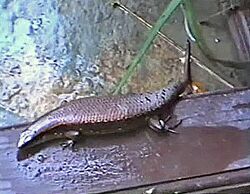Biology:Tytthoscincus temasekensis
| Tytthoscincus temasekensis | |
|---|---|

| |
| Tytthoscincus temasekensis from Singapore | |
| Scientific classification | |
| Domain: | Eukaryota |
| Kingdom: | Animalia |
| Phylum: | Chordata |
| Class: | Reptilia |
| Order: | Squamata |
| Family: | Scincidae |
| Genus: | Tytthoscincus |
| Species: | T. temasekensis
|
| Binomial name | |
| Tytthoscincus temasekensis Grismer, Wood Jr., Lim, & Liang, 2017
| |
Tytthoscincus temasekensis, common name Singapore swamp skink, is a species of skinks belonging to the family Scincidae.[1]
Etymology
The species name temasekensis derives from the word Temasek meaning 'Sea Town' in Old Javanese, an ancient name of a settlement in Singapore. As the Latin suffix -ensis means 'from a place', the epithet temasekensis can be translated from Singapore.[2]
Distribution
This uncommon species is present in Singapore, and in restricted areas of the Peninsular Malaysia.[3]
Habitat
Singapore swamp skink occurs in freshwater swamp forest, in peat swamp areas and close to shallow streams.[3]
Description
Tytthoscincus temasekensis can reach a total body length of about 7.6 cm (3.0 in). These small skinks have an elongate and dorso-ventrally flattened body, with smooth scales. Limbs and feet are tiny, short and slender. Its dorsal basic colour is dark brown, with a pale line from the head to the end of the tail. The abdomen is pale brownish. Young skinks are pale brown and slightly pinkish.[2][3][4]
Behavior
These skinks are skilled swimmers and very elusive. Usually they hide amongst or beneath leaf litter next to streams or swamps.[3]
References
| Wikimedia Commons has media related to Tytthoscincus temasekensis. |
- ↑ Biolib
- ↑ 2.0 2.1 The Reptile Database
- ↑ 3.0 3.1 3.2 3.3 Ecology Asia
- ↑ Grismer, L. L., Wood Jr, P. L., Lim, K. K., & Liang, L. J. (2017). A new species of swamp-dwelling skink (Tytthoscincus) from Singapore and Peninsular Malaysia. Raffles Bulletin of Zoology, 65, 574-584.
External links
Wikidata ☰ Q47009071 entry
 |

